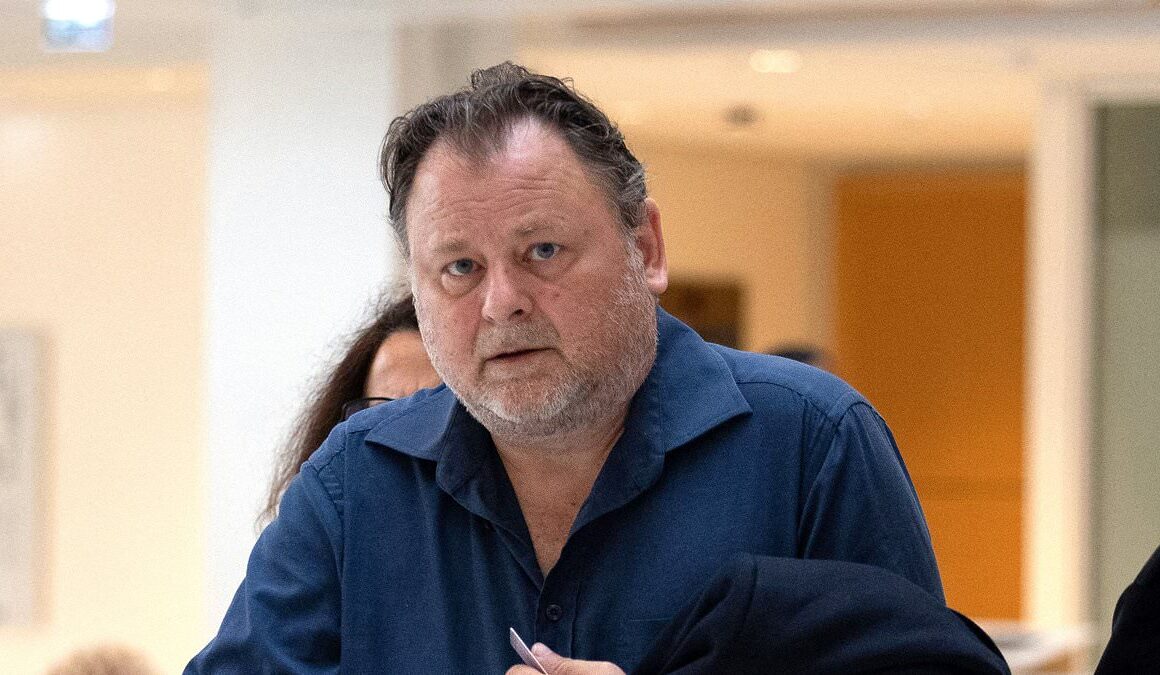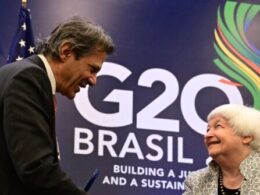A French film director will stand trial on charges of sexually assaulting a child actor, sources close to the case revealed today.
Christophe Ruggia, 59, is expected to stand trial in December following allegations he assaulted Adèle Haenel, 35, in the early 2000s when she was under 15.
Ruggia was in his mid to late 30s at the time.
The investigating magistrate said in a court document that Haenel’s accusations were ‘precise and consistent’ and that she had suffered psychological consequences from the alleged assaults.
The age difference and Ruggia’s alleged ‘psychological control’ exerted through his position of authority were given as potentially aggravating circumstances.
Ruggia has denied the charges, although the director admitted to committing ‘errors’. His lawyers declined to comment on Saturday.

French film director Christophe Ruggia (L) walks with his lawyer Fanny Colin (R) at The Paris Courthouse in Paris on June 29, 2023 to face allegations of sexual offences against a minor

Adele Haenel poses during a photocall for the film ‘Portrait Of A Lady On Fire’ in 2019
The Ruggia case is part of a string of revelations that have prompted new questions about instances of sexual violence in French society, particularly in the artistic world.
Ruggia, now 59, was charged in 2020 over the accusations.
Haenel, now 35, lodged a complaint against Ruggia after accusing him of subjecting her to ‘constant sexual harassment’ from the age of 12 to 15, including ‘forced kisses on the neck’ and touching.
Ruggia directed her in the 2002 movie ‘The Devils’, her first film role.
The accusations stunned the French film industry, which has been slower than Hollywood to react to the #MeToo movement turning the spotlight on sexual abuse in the arts.
Ruggia at first fiercely denied harassing Haenel before asking her to forgive him.
He then said that she was targeting him because he denied her a part in another film.
Haenel won support from some top names of French cinema, including actress Marion Cotillard who praised her for ‘breaking a silence that was so heavy’.
Haenel, who starred in the period drama ‘Portrait of a Lady on Fire’, initially declined to file an official complaint, slamming the ‘contempt with which the judicial system treats women’.
But prosecutors opened an investigation of their own accord and Haenel did file a complaint.
Haenel explained in a statement it was her ‘responsibility as a public personality’ to take part in the process, ‘given the gravity of the facts and the consequences for everyone’.
She said Ruggia’s public denials had made her ‘determined to obtain through judicial means the status of a victim’.

Haenel accused Ruggia, who directed her in the 2002 movie ‘The Devils,’ (pictured) her first film role, of repeatedly touching and kissing her

Christophe Ruggia giving a press conference in Paris in 2015
Judith Godreche, another actor, said earlier this year two French directors sexually abused her when she was a teenager.
Godreche accused filmmaker Benoit Jacquot of raping her during a six-year relationship that started when she was 14 and he was 25 years her senior.
She also accused another director, Jacques Doillon, of sexually abusing her when she was 15.
Late last year, footage of film star Gerard Depardieu making obscene comments sparked an outcry in the country.
The uproar intensified after President Emmanuel Macron said the actor had become the target of a ‘manhunt’.
Rights activists denounced Macron’s comments as an ‘insult’ to all women who have suffered sexual violence.
Celebrity actors and former French first lady Carla Bruni joined dozens of celebrities in denouncing the ‘lynching’ of Depardieu in an open letter.
The director, who has made more than 200 films and television series, was charged with rape in 2020 and has been accused of sexual harassment and assault by more than a dozen women.
He faces fresh scrutiny following the airing of a documentary late last year in which he was heard making explicit sexual comments in the presence of a female interpreter and sexualising a ten-year-old girl riding a horse.
The ‘Fall of the Ogre’ documentary broadcast in France on December 7 sparked what French media is calling a ‘#MeToo moment in French cinema’.
France24 wrote on December 14: ‘For more than a year after the rape allegations against French actor Gerard Depardieu, the film industry shrugged its shoulders and the cinematic legend with more than 200 titles to his name continued working.’
The actor was charged with rape in 2020 and has also faced 13 accusations of sexual harassment or assault. He maintains his innocence.
The inflammatory documentary showed Mr Depardieu on a 2018 trip to North Korea.
It begins with the 74-year-old actor ogling a woman and saying: ‘Oh là là, très belle’, as reported by The Telegraph.
It also shows a seemingly intoxicated Depardieu making a number of explicit comments to make himself laugh, according to the report. And when the actor visits a horse riding centre, he reportedly remarks that children riding around the enclosure are ‘sl**s’.
He is reported to ask his female interpreter: ‘Why don’t you get on a horse? It does you good, you know. Generally, women who ride like a lot of other things, there’s a life in it.’
He is also reported to have turned to her after weighing himself in one scene, commenting: ‘124 kilos, and right now I’m not erect, erect is 126. I’ve got a beam in my pants.’








